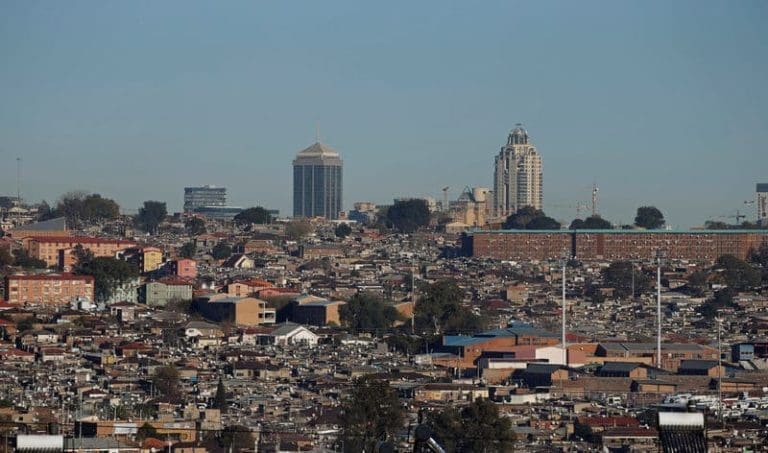The South African government is planning to decrease the headcount in 29 critically overcrowded informal settlements across Gauteng, KwaZulu-Natal, the Western Cape and Eastern Cape as COVID-19 continues to spread.
The Sunday Times reported that the plan is at an “advanced stage”.
The elderly, disabled and shack dwellers will likely be the first to be evacuated and housed in emergency accommodation, the department has said.
The National Coronavirus Command Council decided to enforce a 21-day nation-wide lockdown with effect from midnight Thursday 26 March 2020, until midnight on Thursday 16 April 2020.
In a televised address to the nation, President Cyril Ramaphosa announced that the lockdown is necessary in order to save lives in light of the Coronavirus.
During a media briefing on March 24, Human Settlements, Water and Sanitation Minister Lindiwe Sisulu announced that, in order to counter the effects of the lockdown on South Africa’s roughly 1.4 million informal households, a process of ‘de-densification’ would be initiated.
The government has had decades to raise these communities up to the minimum levels dictated by the National Housing Code, so Sisulu’s address caused an uproar. It also created further questions about how the lockdown would impact on the country’s most marginalised populations, and how the spread of COVID-19 could possibly be stemmed in overcrowded communities that lack even basic sanitation.
For more read: ‘De-densifying’ and ‘decanting’ — how the government hopes to contain Covid-19 in informal settlements
Sisulu appeared to acknowledge that the historic nationwide lockdown, announced by President Cyril Ramaphosa on Monday, will have major implications on the lives of every South African, but none more so than the poor.
The national department was hesitant to give much detail due to the “sensitivity” of the relocations, but the affected provinces confirmed details of the plan.
Western Cape human settlements MEC Tertius Simmers told the Sunday Times that the settlements in Dunoon and Philippi in Cape Town would be the first port of call.
In KwaZulu-Natal, the settlements in focus are Kennedy Road and Amaoti in Durban.
“The focus would be on freeing up some space by removing existing units, be they shacks or standing houses. It is estimated that a quarter of residents in each settlement may need to relocate,” said KwaZulu-Natal human settlements spokesperson Mbulelo Baloyi.
Eastern Cape spokesperson Masiza Mazizi said the provincial department has identified 21 settlements for evacuation. Plans include moving 2,000 people from the settlement of Duncan Village in East London, home to as many as 100,000 people.
In Gauteng, spokesperson Castro Ngobese said the Housing Development Agency is finalising the procurement process for temporary shelters. The Sunday Times has learnt that areas affected in Gauteng will include Stjwetla in Sandton and Mooiplaats in Pretoria.
Human settlements national director-general Neville Chainee said there is no time frame for when families will be asked to move.
“The relocation of households is dependent on a number of factors and these include susceptibility to the danger of a virulent spread of Covid-19, makeup of households and consent of households to be relocated,” he said.
Also read: Coronavirus: North West Quarantines all Confirmed COVID-19 patients
North West Health MEC Madoda Sambatha said the patient was immediately put under the care of the department.
“The person is now under the care of the department. We should at all-time know where COVID-19 positive people and their contacts are to prevent further spread. That way, we will be able to monitor their prognosis and make appropriate decisions,” Sambatha said.
Meanwhile, MEC Sambatha together with his Agriculture counterpart in the province, Desbo Mohono, inspected two mine hospitals in the Matlosana area for their readiness to receive state patients.
Also read: Coronavirus: Significant Reduction in Crime Since Lockdown
Police Minister Bheki Cele has welcomed the dramatic reduction in serious and violent crimes during the lockdown to curb the COVID-19 pandemic.
In a statement issued on Sunday, Cele said indications were this was due to, among others, the prohibition of the sale and movement of liquor since the nationwide lockdown 10 days ago.
The Ministry in the statement said the analysis is based on a preliminary report that is yet to undergo the necessary verification and endorsements.
Analysing the crime and comparing the first week of the lockdown to the same period in 2019, Cele said murder cases had dropped from 326 to 94, while rape cases dropped from 699 to 101.


2 Comments
I witnessed mass relocation in Turkey and Syria. It creates havoc. People cannot be relocated with all they have. So they will end up even more impoverished, frustrated and demoralised. The fact is, what little they will have to leave behind will be stolen or will decay.
Rather spend the money on immediate mass immunity enhancement through vitamin supplements, subsidized water, fresh fruit and vegetables. Building immunity as rapidly as possible is one of the cornerstones of survival.
Lockdown extension it will kill us than a virus, we will be locked with empty stomach coz of no work no pay.. We experience LOCKDOWN in different ways.